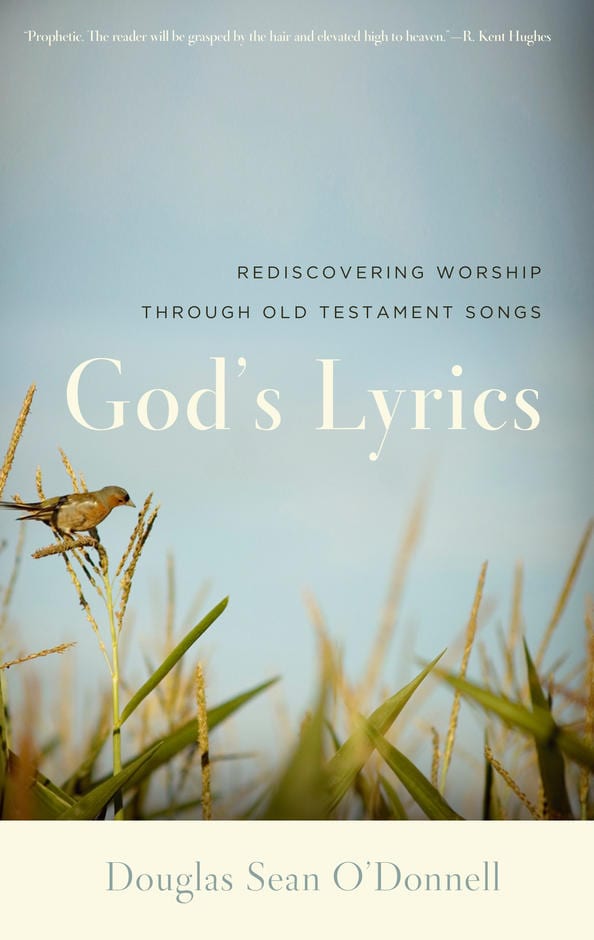“Let me write the songs of a nation—I don’t care who writes its laws,” said the Scottish author and politician Andrew Fletcher (1653–1716).
Songs shape our thoughts, stimulate our desires, and motivate us to behave in new, imaginative ways. You hear a song from decades past and are instantly transported to the fateful day when that cute brunette dumped you. On the other hand, songs of Scripture, empowered by God’s Spirit, have the effect of piercing our calloused hearts, awakening our spiritual affections, and eventually leading us behind the mortal veil to behold the indescribable beauty of Christ. Herein is the burden of God’s Lyrics: Rediscovering Worship Through Old Testament Songs: to rediscover the great value and content of Scriptural songs for Christian orthodoxy and doxology (xx).
Whether O’Donnell has ever kissed the Blarney Stone I don’t know, but he has an extraordinary gift of communication, turning phrases and employing metaphors with great effect. This is especially apparent when he describes the importance of God-centered worship, which he does with pastoral insight and sensitivity, buttressing his analysis and applying it with contemporary relevance. Here is a little taste:
Now, how big do you think we look to the God who created this immense and awesome universe: the heavens (all that is up there and out there) and the earth (all that is down here). Like ants? No, we’re not that big. Like a speck of dust in an ant’s eye? No, we’re not even that big. Like nothing? No, we’re not that small. We are something to God, but so often not what we think (7).
With attention consistently focused upon the splendor of God, O’Donnell sets the stage in his introduction, explaining that many contemporary and some classic lyrics have blurred our perception of God and his work. By showing characteristics of these “sacred songs” (1 Chron. 16:42) within the sacred writings—such as their God-centered yet personal nature, their emphasis on the works of God in salvation history, and especially their joy in judgment—we will offer both a corrective and a call: a corrective to sing lyrics that will not only make us “wise for salvation,” but will also be profitable for “training in righteousness” (2 Tim. 3:14–16), as well as a call to return to the Word of God (the very words of God!) in our worship of him.

God's Lyrics: Rediscovering Worship Through Old Testament Songs
Douglas Sean O'Donnell
God's Lyrics: Rediscovering Worship Through Old Testament Songs
Douglas Sean O'Donnell
Douglas O’Donnell draws out the historical, exegetical, and theological significance of the songs of Moses, Deborah, Hannah, David, and Habakkuk. He then shows, in the light of the person and work of Jesus Christ, how the lyrics of God’s Word apply to contemporary congregational singing.
In the first of three overall sections, O’Donnell explores a handful of Old Testament songs of praise (i.e., The Song of Moses, Ex. 15:1–21; The Song of Yahweh, Deut. 32:1–43; The Song of Deborah, Judg. 5:2–31; The Songs in Samuel, 1 Sam. 2:1–10; 2 Sam 22:2–51; The Song of Habakkuk, Hab. 3:1–19). These texts have been carefully chosen on the basis of their redemptive historical significance, connecting the dots of Hebrew promise and fulfillment in the forward-moving direction of salvation. The result is a biblical theology of divine praise that is as relevant today as it was for ancient Israel.
From his investigation, O’Donnell elucidates four characteristics that recur in biblical song. In the book’s foreword, T. David Gordon summarizes these points (ix): “The Lord is at the center; that is, our God is addressed, adored, and ‘enlarged.’ His mighty acts in salvation history (not merely or primarily our personal experience of redemption) are recounted. His acts of judgments are rejoiced in. His ways of living (practical wisdom) are encouraged.”
Part two, titled “Applications for Christian Worship” explores the meaning and significance of the Old Testament theme of praise. Here is a wealth of practical wisdom as O’Donnell uses the four above-mentioned characteristics of biblical song to evaluate classical hymns and contemporary worship music. As O’Donnell waxes eloquent about the kingdom directed nature of praise, one quickly recognizes a disconnection between a biblically principled approach and the self-centered emphasis of many churches today. This may be the most provocative part of the book. Thankfully however, where many such critiques tend to sound crotchety and irritable, O’Donnell is refreshingly constructive.
Although section two is limited to the content of songs, that is, the lyrics we sing, without comment on Christian music styles and musicians, it nonetheless offers a great deal to think about. In a nutshell it is about “calling Christians out of the realm of the duped and simpleminded when it comes to the lyrical content of our songs” (159).
An incisive quote from New Testament scholar Gordon Fee at the start of part three drives home O’Donnell’s point, “Show me a church’s songs and I’ll show you their theology.” In an attempt to steer Christians in the proper direction, away from “Twinkie Tunes and Ding-Dong Theology,” O’Donnell invites readers to compose their own songs to reflect biblical priorities. Titled “New Hymns and Old Texts,” this third section presents several such songs which O’Donnell himself has written, new lyrics put to old tunes.
Full scripture, subject, and name indices in the appendix enable readers to access information with ease. The appendix also contains a fascinating study evaluating the top songs that have been sung in American churches from 2000 to 2008 (189).
In addition to reading God’s Lyrics, pastors and church leaders will want to employ it as a basis for discussion in their churches. The important questions that it raises are indispensable to the ongoing conversation about worship, and its quality of writing makes it not only accessible but enjoyable. Most importantly, it raises our sights above the horizon of self-centered singing by encouraging us to use lyrics that are far better suited to the majestic God whom we address.

































